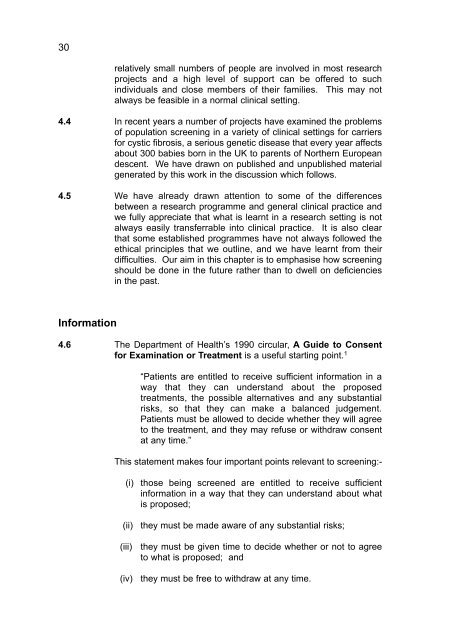Genetic screening: ethical issues - Nuffield Council on Bioethics
Genetic screening: ethical issues - Nuffield Council on Bioethics
Genetic screening: ethical issues - Nuffield Council on Bioethics
Create successful ePaper yourself
Turn your PDF publications into a flip-book with our unique Google optimized e-Paper software.
30<br />
relatively small numbers of people are involved in most research<br />
projects and a high level of support can be offered to such<br />
individuals and close members of their families. This may not<br />
always be feasible in a normal clinical setting.<br />
4.4 In recent years a number of projects have examined the problems<br />
of populati<strong>on</strong> <str<strong>on</strong>g>screening</str<strong>on</strong>g> in a variety of clinical settings for carriers<br />
for cystic fibrosis, a serious genetic disease that every year affects<br />
about 300 babies born in the UK to parents of Northern European<br />
descent. We have drawn <strong>on</strong> published and unpublished material<br />
generated by this work in the discussi<strong>on</strong> which follows.<br />
4.5 We have already drawn attenti<strong>on</strong> to some of the differences<br />
between a research programme and general clinical practice and<br />
we fully appreciate that what is learnt in a research setting is not<br />
always easily transferrable into clinical practice. It is also clear<br />
that some established programmes have not always followed the<br />
<str<strong>on</strong>g>ethical</str<strong>on</strong>g> principles that we outline, and we have learnt from their<br />
difficulties. Our aim in this chapter is to emphasise how <str<strong>on</strong>g>screening</str<strong>on</strong>g><br />
should be d<strong>on</strong>e in the future rather than to dwell <strong>on</strong> deficiencies<br />
in the past.<br />
Informati<strong>on</strong><br />
4.6 The Department of Health’s 1990 circular, A Guide to C<strong>on</strong>sent<br />
for Examinati<strong>on</strong> or Treatment is a useful starting point. 1<br />
“Patients are entitled to receive sufficient informati<strong>on</strong> in a<br />
way that they can understand about the proposed<br />
treatments, the possible alternatives and any substantial<br />
risks, so that they can make a balanced judgement.<br />
Patients must be allowed to decide whether they will agree<br />
to the treatment, and they may refuse or withdraw c<strong>on</strong>sent<br />
at any time.”<br />
This statement makes four important points relevant to <str<strong>on</strong>g>screening</str<strong>on</strong>g>:-<br />
(i)<br />
(ii)<br />
(iii)<br />
(iv)<br />
those being screened are entitled to receive sufficient<br />
informati<strong>on</strong> in a way that they can understand about what<br />
is proposed;<br />
they must be made aware of any substantial risks;<br />
they must be given time to decide whether or not to agree<br />
to what is proposed; and<br />
they must be free to withdraw at any time.
















